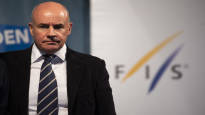The management of the international skiing federation FIS is once again heavily criticized by its member countries. Decision-makers interviewed by , SVT and NRK question the legality of FIS’s activities.
The dispute between the International Ski Federation FIS and the major skiing countries over the media and marketing agreement, which is essential for the national federations, continues.
FIS wants its president by Johan Eliasch with the leadership to bring together the national Ski Federations under the same umbrella and to be in the place of the treasure guard in the distribution of money for the skiing sports. Until now, the national federations have negotiated their media and marketing contracts regarding the World Cup directly with the media giants themselves.
Last July, to everyone’s surprise, Eliasch announced that a new centralized agreement was ready. The big ski resorts got fired up, because Eliasch just promised money without proof.
The Nordic broadcasting companies , SVT and NRK have together opened up the conflict that has shaken the winter sports circles in recent months. In the power struggle, one party is the FIS and the other is the big European skiing countries, which have formed an alliance called Snowflake.
The saga took a new turn on Friday, when the FIS board gave the green light to a centralized media contract.
In today’s meeting, the FIS board has voted in favor of a centralized agreement and paved the way to sign an exclusive agreement with the media company Infront, FIS said in its press release.
Some of the board members confirm that the media agreement and its content were on the list of topics to be discussed. Instead, the vote on the topic came completely out of the blue.
– We only found out about it during the meeting, Swedish board member Mats Årjes told.
In addition to the surprise, the decision to approve the centralized media agreement was implemented in a closed vote. The board members therefore did not know who voted and how.
According to Årjes, closed voting has been FIS’s method of operation only when the government chooses the organizers of the World Championships.
– I have not been involved in something like this before – and I have been on the board for at least 14 years, Årjes said.
The Swedish decision-maker received support from a Norwegian FIS board member From Erik Röste.
– This came without any preparation, Röste said.
FIS vice-presidents Roman Kumpost and Martti Uusitalo declined to comment on the vote. Chairman Eliasch has not responded to contact.
Big stakes
In the dispute regarding media contracts, the advice of the national unions is about vital issues.
Agreements are not public information. According to Urheilu, the agreement between the Finnish Ski Federation and the media company Infront for the World Cup brings the Ski Federation around 3–3.5 million euros per season. The amount is about half of the Ski Association’s budget.
Snowflake countries, i.e. Germany, Austria, Switzerland, Italy, Slovenia, Norway, Sweden and Finland, are not against a centralized agreement. The countries want sufficient guarantees that the new agreement will bring them more money than the current one. FIS has not been able to convince the Snowflake countries.
For this reason, the Snowflake countries have prepared their own centralized agreement and even flashed their own competition series as an alternative. Snowflake has been together since October 2022. In February, almost a year and a half later, Eliasch and the top bosses of FIS agreed to sit at the same negotiating table with the countries.
Marketing Manager of the Swiss Ski Association by Diego Züger according to which the negotiation relationship recently experienced a setback.
– We are surprised by FIS’s latest output. The chairman (Eliasch) stopped negotiations with us last week. It’s a shame, because we have to present our own version of a centralized agreement that would bring more resources to everyone, Züger communicated.
“Harming our species”
At the heart of the dispute is a lack of knowledge about powers. According to government sources, FIS is ready to go to court to get the media and marketing rights of the World Cup from the federations.
The countries, on the other hand, consider that a decision of this size must be discussed in the FIS Congress, which has the highest decision-making power. It takes place once a year, this time in Reykjavik, Iceland at the beginning of June.
According to Züger, Snowflake countries also do not rule out the possibility of legal action.
Executive Director of the Austrian Ski Association Christian Scherer and executive director of the Norwegian Ski Association Arne Baumann said they were consulting their legal experts.
– This latest turn hurts our species, Züger described.
